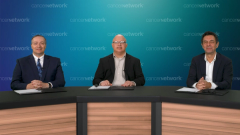
PERSEUS: Daratumumab plus VRd in Newly Diagnosed Multiple Myeloma Patients
Luciano Costa, MD, reviews recent data from the PERSEUS trial investigating the combination of daratumumab, bortezomib, lenalidomide and dexamethasone in newly diagnosed multiple myeloma patients.
Episodes in this series

Summary
Over the past 15 years, the standard triplet regimen of a proteasome inhibitor, an immunomodulatory agent, and steroids has solidified as the foundation of management. Recent trials, including the phase three PERSEUS trial, explore the impact of adding monoclonal antibodies, such as daratumumab, to this regimen in eligible patients for autologous transplant.
The PERSEUS trial, comprising over 700 patients, reveals significant benefits in progression-free survival (PFS) with the addition of Daratumumab to the VRD backbone. Notably, the hazard ratio is 0.42, indicating a substantial reduction in the risk of progression. At 48 months, the median PFS for daratumumab-VRd is 84.3%, compared to 67.7% for VRd alone.
The impact is consistent across subsets, including high-risk disease, demonstrating a higher proportion of patients achieving complete response and minimal residual disease negativity with daratumumab-VRd. While overall survival data are immature, the trial suggests improved depth, quality, and duration of responses.
Toxicity profiles align with expectations for monoclonal antibody additions, with manageable cytopenia and mild respiratory infections. In conclusion, the PERSEUS trial underscores the therapeutic benefits of incorporating daratumumab into induction, consolidation, and maintenance, offering improved outcomes for newly diagnosed multiple myeloma patients eligible for transplant. The findings complement earlier studies and contribute to advancing the standard of care in myeloma treatment.
Summary was AI-generated and edited for clarity and readability.
Newsletter
Stay up to date on recent advances in the multidisciplinary approach to cancer.







































